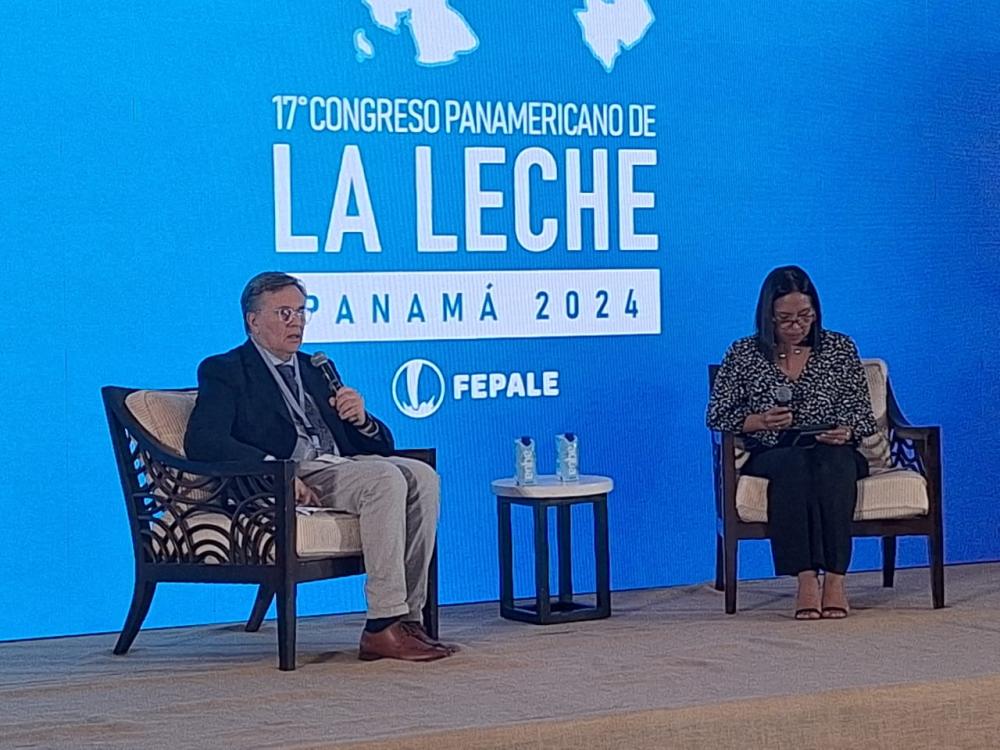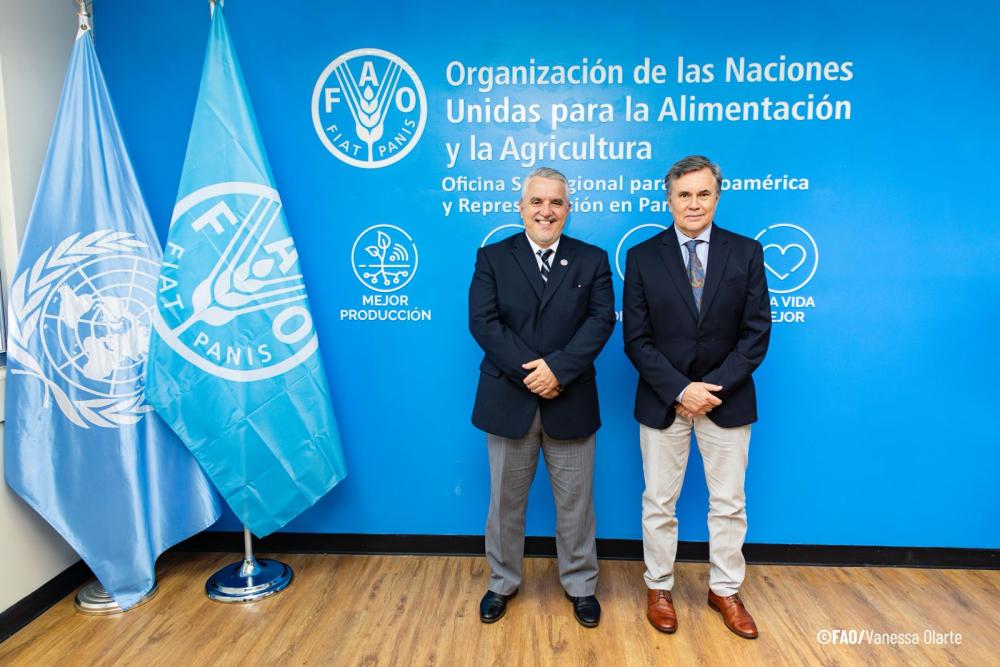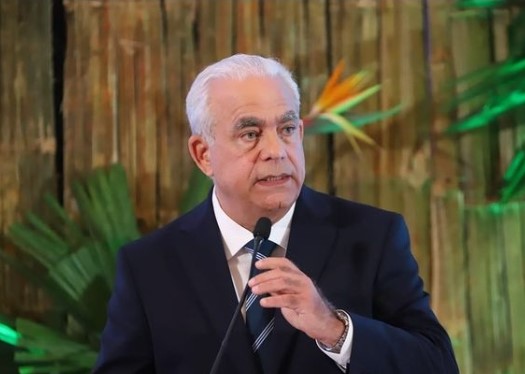Panama’s agriculture sector is a crucial component of the country’s economy, playing a vital role in the food supply chain, job creation and rural development. Today, crop and livestock yields are being affected by climate change, which causes prolonged periods of drought or intense rainfall.

Panama City, 2 September 2024 (IICA). The Director General of the Inter-American Institute for Cooperation on Agriculture (IICA), Manuel Otero, made an official visit to Panama to meet with senior government officials and representatives of the private sector with a view to strengthening joint efforts to boost the productivity and resilience of the Central American country’s agriculture sector.
Otero was received by Panama’s new Minister of Agricultural Development, Roberto Linares, and pledged IICA’s support for the implementation of the ministry’s priorities. The IICA Delegation in Panama, through its Representative in that country, Miguel Ángel Arvelo, drew up an agenda that contains a variety of cooperation actions on issues that include the development of the bioeconomy, the strengthening of animal and plant health, the promotion of trade, and the commitment to digital agriculture.
Otero also invited Linares to participate in the United Nations Climate Change Conference (COP 29) in November, which will be taking place in Baku, Azerbaijan. There, at the most important global forum for environmental debate, IICA, for the third consecutive year, intends to set up a pavilion called the Home of Sustainable Agriculture of the Americas, which will be used to inform the world about the advances that the continent’s agriculture has made with mitigation and adaptation actions.
Panama’s agriculture sector is a crucial component of the country’s economy, playing a vital role in the food supply chain, job creation and rural development. Today, crop and livestock yields are affected by climate change, which generates prolonged periods of drought or intense rainfall.
Minister Linares has more than 40 years’ experience in the agriculture and maritime sectors, where he has implemented advanced technologies and optimized resources and processes to significantly increase production.
Otero also met with Eduardo Ortega, Secretary of Science and Technology, to review ongoing cooperation efforts and identify future areas of strategic alignment, especially with regard to the Controlled Environment Research and Production Center (CIPAC), a project designed to boost the supply of products and services, as well as technology development and transfer for greenhouses and Vertical Agriculture (VA).
FEPALE Congress
In Panama, Otero also took part in the 17th Pan-American Dairy Congress, a benchmark event for the dairy sector in the Americas organized by the Pan-American Dairy Federation (FEPALE). The organization is made up of the main actors in the dairy chain across the region. Its main objective is to promote the development of the dairy sector in the Americas and serve as a forum for relations and cooperation among the different actors.
The FEPALE Congress was an opportunity for the participants to update their knowledge through presentations, workshops, networking, field trips, and spaces in which both the public and private sectors were able to share their experiences.
The participants included dairy farmers, company representatives, researchers, academics, students, leaders of associative enterprises, technicians, specialists and professionals from primary production and the processing industry, as well as government representatives.
The Director General of IICA was one of the speakers in a panel discussion on public policies for the dairy sector and the regional outlook. He noted that the global and regional context had changed due to political, economic and climatic shocks. “The overlapping crises are having negative effects, especially in low-income countries”, he cautioned. He also observed that the trade and technology war between certain countries and the resurgence of more protectionist industrial policies are some of the consequences of the new scenarios.

Otero emphasized that the dairy sector plays a key role in the region’s economic, social, food and nutrition security, with Brazil, Mexico, Argentina and Colombia as the main producers. He explained that milk production in Latin America and the Caribbean, which currently stands at around 86 million tons per year, is expected to grow to 94.6 million tons by 2032. He pointed up the huge potential for growth in milk production if productivity gaps in the region are reduced.
He highlighted some of the challenges facing the dairy sector in Latin America and the Caribbean, such as the need to improve trade capabilities; more effective prevention and control of animal diseases; work on regulatory convergence between countries; and the reduction of greenhouse gas emissions, which contribute to climate change.
During the FEPALE Congress, Otero held a meeting with representatives of the International Dairy Federation (IDF) to review and strengthen the joint work program implemented in recent years. The meeting reaffirmed IICA’s commitment to supporting the dairy sector throughout the Americas.
Workshop on public policies
During his stay in Panama City, Otero also gave the opening remarks in a workshop entitled “Towards a New Generation of Public Policies for Agrifood Systems”, which was held at the offices of the IICA Delegation.
During two days of sessions, the participants discussed the new contexts in the region and across the globe, and drew up a draft document setting out a unified approach to new, evidence-based public policies that will be used as the basis for coordinating a work program for the Americas.
Experts took part from international organizations such as the Inter-American Development Bank (IDB), the Development Bank of Latin America and the Caribbean (CAF), the International Food Policy Research Institute (IFPRI), the World Bank, the Economic Commission for Latin America and the Caribbean (ECLAC), the Food and Agriculture Organization (FAO) and the International Center for Tropical Agriculture (CIAT).
The IICA Director General also met with FAO Representative Adoniram Sanches to closely coordinate the two organizations’ agendas and thus support the priorities of countries in the region more effectively.
Otero also took the opportunity to review the progress of IICA projects and the work of Institute staff in Panama, ensuring that the organization’s efforts are aligned with the priorities of Panama’s new government.

More information:
Institutional Communication Division.
comunicacion.institucional@iica.int











